Olympic Games—Montreal 1976
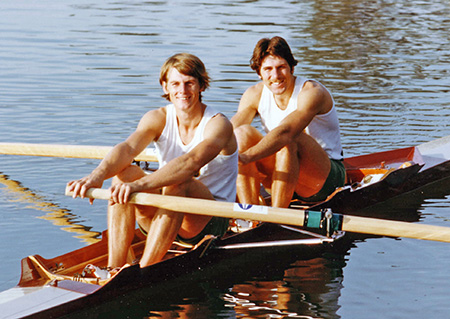
Men's Coxless Pair
str Chris Shinners & bow Ian Luxford
These Games unfortunately suffered by the withdrawal of 22 third world nations, mainly African, through political issues.
The course was cleverly constructed and well designed.
From a rowing perspective, these Games were important for the introduction of women's events and also the new event of the men's quad scull.
The East Germans dominated the rowing again and, in particular, the new events. Every member of that team won a medal. Current Australian Head Women's coach Harald Jahrling won the first of his two gold medals in the coxed pair at these Games. The Soviet team also performed strongly.
A full listing of all 1976 Olympic rowing competitors can be found through this link.
A complete set of 1976 Olympic rowing results can be found through this link.
A copy of 1976 Lucerne Regatta program can be found through this link.
Selection
The Australians did not send any women to these Games although the stand out women's crew at the time sought selection. This crew was the Victorian four of Pam Murray, Jill Callan, Viv Rowe, Sally Harding, Jan Coxhead and coach Peter Philp.
Following the Australian Championships, some trialing and seat racing was undertaken to test the speed of the crews and finalise seating. The NSW men's eight, the winning men's pair, the winning men's sculler and the winning women's four were asked to remain after the regatta.
Several 2000 metre courses were raced. The eight was based upon the NSW crew and changes to the bow and two seats were made. The selectors then graded the crews as follows - first men's pair, second men's eight, third Men's sculler and fourth women's four.
The Australian Olympic Federation then cut the women's four from the crews nominated in arriving at the final team claiming that the level of improvement required to meet world class standards was too great. The eighth placing at the 1975 World Championships did not assist their case. The crew and coach were devastated after a controversial year in which they were withdrawn from racing at the Interstate Championships by the Victorian Ladies' Rowing Association over a selection dispute.
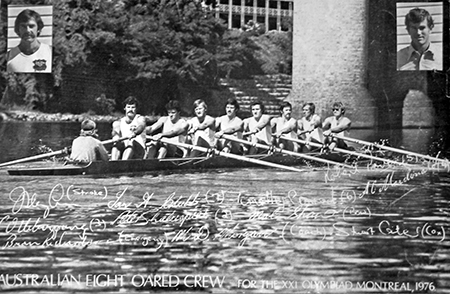
Men's Eight
The men's eight squad of nine people was subjected to seat racing after six weeks to determine the final seating.
The crews participated in a well-organised and long pre-Olympic tour which included ample time to acclimatise and two regattas. The eight also used an Empacher boat which was equal with their competitors.
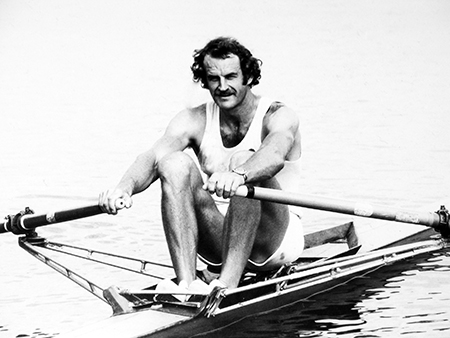
Ted Hale
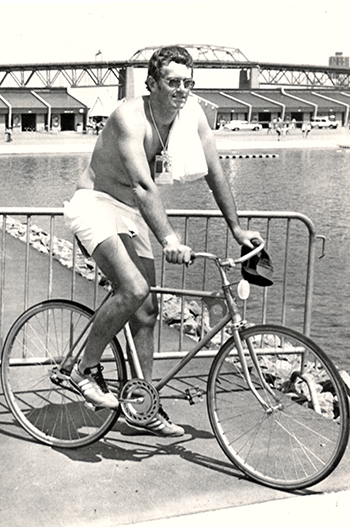
Coach Mike Morgan at the Games
Racing—Women
Women's Single Scull
E1: 1st BUL, 2nd URS, 3rd HUN, 4th FRA, 5th POL, 6th CAN
E2: 1st GDR, 2nd USA, 3rd NED, 4th FRG, 5th NOR
R1: 1st URS, 2nd NED, 3rd FRG, 4th POL, 5th CAN
R2: 1st USA, 2nd HUN, 3rd FRA, 4th NOR
Final B: 7th FRA, 8th FRG, 9th POL, 10th NOR, 11th CAN
Final: 1st GDR 4:05.56 (Christine Scheiblich), 2nd USA 4:06.21 (Joan Lind),
3rd URS 4:10.24 (Elena Antonova), 4th BUL 4:10.86, 5th NED 4:18.71, 6th
HUN 4:22.59
Women' Double Scull
E1: 1st URS, 2nd GDR, 3rd NOR, 4th CAN, 5th USA
E2: 1st BUL, 2nd NED, 3rd FRA, 4th TCH, 5th AUT
R1: 1st GDR, 2nd CAN, 3rd FRA, 4th AUT
R2: 1st NOR, 2nd USA, 3rd NED, 4th TCH
Final B; 7th NED, 8th TCH, 9th FRA, 10th AUT
Final: 1st BUL 3:44.36 (Svetla Otsetova, Zdravka Yordanova), 2nd GDR 3:47.86
(Sabine Jahn, Petra Boesler), 3rd URS 3:49.93 (Leonora Kaminskaite, Genovate
Ramoshkene), 4th NOR 3:52.18, 5th USA 3:58.25, 6th CAN 4:06.23
Well known FISA official Svetla Otzetova with partner Zdravka Yordanova won this event. Svetla is an architect and is a member of FISA's Regatta Commission. Her skills as an architect are used well in this activity in ensuring courses comply with FISA specifications.
Women's Coxed Quad Scull
E1: 1st URS, 2nd ROM, 3rd TCH, 4th USA, 5th DEN
E2: 1st GDR, 2nd BUL, 3rd HUN, 4th CAN
R1: 1st ROM, 2nd DEN, 3rd HUN, 4th CAN
R2: 1st BUL, 2nd TCH, 3rd USA
Final B: 7th USA, 8th HUN, 9th CAN
Final: 1st GDR 3:29.99 (Anke Borchmann, Jutta Lau, Viola Poley, Roswietha
Zobelt, Liane Weigelt), 2nd URS 3:32.49 (Anna Kondrachina, Mira Bryunina,
Larissa Aleksandrova, Galina Ermolaeva, Nadezhda Chernysheva), 3rd ROM
3:32.76 (Ioana Tudoran, Maria Micsa, Felica Afrailoala, Elizabeta Lazar,
Elena Giurca), 4th BUL 3:34.13, 5th TCH 3:42.53, 6th DEN 3:46.99
Women's Coxless Pair
E1: 1st FRG, 2nd BUL, 3rd URS, 4th GDR, 5th POL, 6th GBR
E2: 1st CAN, 2nd ROM, 3rd TCH, 4th USA, 5th HUN
R1: 1st BUL, 2nd GDR, 3rd TCH, 4th GBR, 5th HUN
R2: 1st URS, 2nd ROM, 3rd USA, 4th POL
Final B; 7th USA, 8th POL, 9th TCH, 10th GBR, 11th HUN
Final: 1st BUL 4:01.22 (Siika Kelbacheva, Stoyanka Grouicheva), 2nd GDR
4:01.64 (Angelika Noack, Sabine Dahne), 3rd FRG 4:02.35 (Edith Eckbauer,
Thea Einoder), 4th URS 4:03.27, 5th CAN 4:08.09, 6th ROM 4:15.44
Women's Coxed Four
E1: 1st GDR, 2nd ROM, 3rd USA, 4th GBR
E2: 1st BUL, 2nd NED, 3rd CAN, 4th URS
R; 1st NED, 2nd ROM, 3rd URS, 4th USA, 5th CAN; 6th GBR
Final B: 7th CAN, 8th GBR
Final: 1st GDR3:45.08 (Karin Metze, Bianka Schwede, Gabriele Lohs, Andrea
Kurth, Sabine Hess), 2nd BUL 3:48.24 (Ginka Gyurova, Lillana Vaseva, Reni
Yordanova, Mariika Modeva, Kapka Georgieva), 3rd URS 3:49.38 (Nadezhda
Sevostyanova, Lyudmila Krokhina, Galina Mishenina, Anna Pasokha, Lidiya
Krylova), 4th ROM 3:51.17, 5th NED 3:54.36, 6th USA 3:56.50
Women's Eight
E1: 1st URS, 2nd ROM, 3rd CAN. 4th FRG
E2: 1st GDR, 2nd USA, 3rd POL, 4th NED
R: 1st USA, 2nd ROM, 3rd FRG, 4th CAN, 5th POL, 6th NED
Final B: 7th POL, 8th ROM
Final: 1st GDR 3:33.32 (Viola Goretzki, Christiane Knetsch, Ilona Richter,
Brigitte Ahrenholz, Monika Kallies, Henrietta Ebert, Helma Lehmann, Irina
Muller, Marina Wilke), 2nd URS 3:36.17 (Lyubov Talalayeva, Nadezhda Roshchina,
Klavdiya Kozenkova, Elena Zubko, Olga Kolkova, Nelli Tarakanova, Nadezhda
Rozgon, Olga Guzenko, Olga Pugovskaya), 3rd USA 3:38.68 (Javqueli Zoch,
Anita DeFrantz, Carie Graves, Marion Grieg, Anne Warner, Peggy McCarthy,
Carol Brown, Gail Ricketson, Lynn Silliman), 4th CAN 3:39.52, 5th FRG
3:41.06. 6th ROM 3:44.79
A future Vice President of FISA and IOC member, Anita DeFrantz won a bronze medal in this event. Anita was in charge of the 1984 Los Angeles Games and presently manages the Foundation which spends the financial legacy of these Games.
Australian Team
Men's Eight – Fifth
- Bow: Brian J Richardson (VIC)
- 2: Malcolm Shaw (NSW)
- 3: Athol Macdonald (NSW)
- 4: Gary Uebergang (NSW)
- 5: Robert D Paver (NSW)
- 6: Tim Conrad (NSW)
- 7: Ian Clubb (NSW)
- Str: Islay Lee (NSW)
- Cox: Stuart Carter (NSW)
- Coach: Michael D Morgan (NSW)
- Reserve: Peter Shakespeare (WA)
- (Due to injury, Peter Shakespeare replaced Malcolm Shaw in the final.)
Men's Coxless Pair – Eliminated in Repechage
- Bow: Ian Luxford (NSW)
- Str: Chris D Shinners (NSW)
Men's Single Scull – Eighth
- Ted Hale (NSW)
Manager: John D Coates (NSW)
Selectors: Maurice Grace (NSW), Joe Saunders (WA) &
Jim Howden (VIC)
Racing—Men
Men's Single Scull
E1: 1st FRG, 2nd IRL, 3rd GDR, 4th FIN, 5th USA
E2: 1st URS, 2nd ITA, 3rd SWE, 4th ROM, 5th URU
E3: 1st ARG, 2nd AUS, 3rd BEL, 4th AUT, 5th MEX
R:1st FIN, 2nd ROM, 3rd USA, 4th AUT, 5th URU, 6th MEX
SF1: 1st ARG, 2nd FRG, 3rd GDR, 4th ROM, 5th BEL, 6th ITA
SF2: 1st IRL, 2nd URS, 3rd FIN, 4th SWE, 5th USA, 6th AUS
Final B: 7th USA, 8th AUS, 9th SWE, 10th ITA, 11th ROM, 12th BEL
Final: 1st FIN 7:29.03 ( Pertti Karpinnen), 2nd FRG 7:31.67 (Peter-Michael
Kolbe), 3rd GDR 7:38.03 (Joachim Dreifke), 4th IRL 7:42.53 (Sean Drea),
5th URS 7:57.39, 6th ARG 8:03.05
Ted Hale performed admirably in the heat but was well beaten in the semi final. In the final the Finnish sculler, Pertti Karpinnen, caught the early leader and then current World Champion Peter-Michael Kolbe, who had led by eight seconds at the 1000 metre mark. Kolbe still had a winning margin at 1500 metres but collapsed. He said later that his mind went blank and he was partially paralysed.
Men's Double Scull
E1: 1st NOR, 2nd URS, 3rd GBR, 4th ITA, 5th BRA
E2: 1st GDR, 2nd FRG, 3rd FRA, 4th USA
E3: 1st TCH, 2nd SWE, 3rd YUG, 4th BEL
R: 1st USA, 2nd ITA, 3rd BEL, 4th BRA
SF1: 1st NOR, 2nd GBR, 3rd FRG, 4th TCH, 5th ITA, 6th YUG
SF2: 1st GDR, 2nd URS, 3rd URS, 4th USA, 5th SWE, 6th BEL
Final B: 7th ITA, 8th USA, 9th YUG, 10th TCH, 11th SWE, 12th BEL
Final: 1st NOR 7:13.20 (Frank Hansen, Alf Hansen), 2nd GBR 7:15.26 (Chris
Baillieu, Michael Hart), 3rd GDR 7:17.45 (Hans-Ulrich Schmeid, Jurgen
Bertow), 4th URS 7:18.87, 5th FRG 7:22.15, 6th USA 7:50.18
Frank Hansen won silver at Munich and at these Games partnered his brother Alf to win Gold. They also won Gold at the 1975 World Championships and had started as favourites.
Men's Quad Scull
E1: 1st TCH, 2nd FRG, 3rd USA, 4th GBR, 5th SUI, 6th CAN
E2: 1st URS, 2nd GDR, 3rd BUL, 4th FRA, 5th CUB
R1: 1st FRG, 2nd BUL, 3rd FRA, 4th SUI, 5th CAN
R2: 1st GDR, 2nd USA, 3rd GBR, 4th CUB
Final B: 7th GBR, 8th SUI, 9th GBR, 10th CUB, 11th CAN
Final : 1st GDR 6:18.65 (Wolfgang Guldenpfennig, Rudiger Reiche, Karl-Heinz
Bussert, Michael Wolfgramm), 2nd URS 6:19.89 (Yevgeny Duleev, Yuri Yakomov,
Aivar Lazdenieks, Vitautas Butkus), 3rd TCH 6:21.77 (Jaroslav Helebrand,
Vaclav Vochoska, Zdenek Pecka, Vladek Lacina), 4th FRG 6:24.81, 5th BUL
6:32.04, 6t USA 6:34.33
Martin Winter of East Germans withdrew from his crew to undergo an emergency appendectomy and was replaced by Bussert. The sudden change of crew member upset them in the heat but clearly not in the final. Winter went on to win a gold medal in 1980. The seventh placed French crew included well known former FISA official Roland Weill. The eighth placed Swiss crew contained current FISA President and IOC member Denis Oswald in his third Olympic Games.
Men's Coxless Pair
E1: 1st GDR, 2nd USA, 3rd URS, 4th NED, 5th DEN
E2: 1st TCH, 2nd POL, 3rd FIN, 4th CAN, 5th AUS
E3: 1st YUG, 2nd BUL, 3rd FRG, 4th GBR, 5th BRA
R: 1st NED, 2nd GBR, 3rd CAN, 4th AUS, 5th DEN, 6th BRA
SF1: 1st GDR, 2nd TCH, 3rd BUL, 4th FIN, 5th CAN, 6th URS
SF2: 1st USA, 2nd YUG, 3rd FRG, 4th NED, 5th POL, 6th GBR
Final B: 7th URS, 8th FIN, 9th CAN, 10th NED, 11th POL, 12th GBR
Final: 1st GDR 7:23.31 (Jorg Landvoigt, Bernd Landvoigt), 2nd USA 7:26.73
(Calvin Coffey, Michael Staines), 3rd FGR 7:30.03 (Peter Vanroye, Thomas
Straus), 4th YUG 7:34.17, 5th BUL 7:37.42, 6th TCH 7:51.06
Whilst the final margin was close, reports at the time indicated that the win of the Landvoigt twins was never in doubt. The silver by the Americans Coffey and Staines was the only USA medal at these Games. The Australian pair was out-classed in this competition.
Men's Coxed Pair
E1: 1st BUL, 2nd GDR, 3rd URS, 4th POL, 5th USA
E2: 1st FRA, 2nd BRA, 3rd YUG, 4th FRG
E3: 1st TCH, 2nd ITA, 3rd GBR, 4th CAN
R: 1st POL, 2nd USA, 3rd FRG, 4th CAN
SF1: 1st BUL, 2nd URS, 3rd ITA, 4th FRA, 5th YUG, 6th FRG
SF2: 1st GDR, 2nd TCH, 3rd POL, 4th GBR, 5th BRA, 6th USA
Final B: 7th GBR, 8th FRG, 9th FRA, 10th BRA, 11th USA, 12th YUG
Final: 1st GDR 7:58.99 (Harald Jahrling, Friedrich-Wilhelm Ulrich, Georg
Spohr), 2nd URS 8:01.82 (Dmitri Bekhterev, Yuri Shurkalov, Yuri Lorenson),
3rd TCH 8:03.82 (Oldrich Svojanovsky, Pavel Svojanovsky, Ludvik Vebr),
4th BUL 8:11.27, 5th ITA 8:15.97, 6th POL 8:23.02.
The gold medal winning East German crew included Harald Jahrling who won again in 1980.
Men's Coxless Four
E1: 1st USA, 2nd ITA, 3rd BUL, 4th ROM, 5th FIN
E2: 1st FRG, 2nd GBR, 3rd BRL, 4th IRL, 5th ARG
E3: 1st GDR, 2nd URS, 3rd NZL, 4th NOR, 5th CAN
R: 1st NOR, 2nd CAN. 3rd ROM, 4th FIN, 5th IRL, 6th ARG
SF1: GDR, 2nd CAN, 3rd NZL, 4th USA, 5th BUL:, 6th GBR
SF2: 1st NOR, 2nd URS, 3rd FRG, 4th ROM, 5th ITA, 6th BEL
Final B: 7th BUL, 8th USA, 9th ROM, 10th BEL, 11th ITA, 12th GBR
Final: 1st GDR 6:37.42 (Siegfried Brietzke, Andreas Decker, Stefan Semmler,
Wolfgang Mager), 2nd NOR 6:41.22 (Ole Nafstad, Arne Bergodd, Finn Tveter,
Rolf Andreassen), 3rd URS 6:42.62 (Paul Arnemann, Nikolai Kuznetsov, Valery
Iilin, Anushavan Gasan-Dzhalalov), 4th NZL 6:43.23, 5th CAN 6:46.11, 6th
FRG 6:47.44
Men's Coxed Four
E1: 1st NED, 2nd URS, 3rd FRA, 4th BUL, 5th ITA
E2: 1st TCH, 2nd NZL, 3rd IRL, 4th NOR, 5th ARG
E3: 1st GDR, 2nd FRG, 3rd USA, 4th POL
R: 1st POL, 2nd BUL, 3rd ITA, 4th ARG, 5th NOR
SF1: 1st GDR, 2nd BUL, 3rd NZL, 4th USA, 5th NED, 6th FRA
SF2: 1st URS, 2nd TCH, 3rd FRG, 4th IRL, 5th POL, 6th ITA
Final B: 7th IRL, 8th POL, 9th FRA, 10th NED, 11th USA, 12th ITA
Final: 1st URS 6:40.22 (Vladimir Eshinov, Nikolai Ivanov, Mikhail Kuznetsov,
Aleksandr Klepikov, Aleksandr Lukianov), 2nd GDR 6:42.70 (Andreas Schultz,
Rudiger Kunze, Walter Diessner, Ullrich Biessner, Johannes Thomas), 3rd
FRG 6:46.96 (Hans-Johann Farber, Ralph Kubail, Siegfried Fricke, Peter
Niehusen, Hartmut Wenzel(, 4th TCH 6:50.15, 5th BUL 6:52.88, 6th NZL 7:00.17
Men's Eight
E1: 1st AUS, 2nd NZL, 3rd USA, 4th CUB, 5th CAN, 6th JPN
E2: 1st GDR, 2nd GBR, 3rd URS, 4th TCH, 5th FRG
R1: 1st NZL, 2nd FRG, 3rd URS, 4th CUB, 5th JPN
R2: 1st GBR, 2nd TCH, 3rd USA, 4th CAN
Final B: 7th URS, 8th CAN, 9th USA, 10th CUB, 11th JPN
Final: 1st GDR 5:58.29 (Bernd Baumgart, Gottfried Dohn, Werner Klatt,
Hans-Joachim Luck, Dieter Wendisch, Roland Kostulski, Ulrich Karnatz,
Karl-Heinz Prudohl, Karl Heinz Danialowski), 2nd GBR 6:00.82 (Richard
Lester, John Yallop, Timothy Crooks, Hugh Matheson, David Maxwell, James
Clark, Fred Smallbone, Leonard Robertson, Patrick Sweeney), 3rd NZL 6:03.51
(Ivan Sutherland, Trevor Coker, Peter Dignan, Lindsay Wilson, Athol Earl,
Dave Rodger, Alex McLean, Tony Hurt, Simon Dickie), 4th FRG 6:06.15. 5th
AUS 6:09.75, 6th TCH 6:14.29
The Australian eight commenced the Games well with a brilliant win in the heat progressing straight through to the final. The win was despite having steering problems in the side wind which pushed them onto the buoys and caused a ship wreck. In particular they defeated the New Zealand crew who won bronze in the final.
However disaster was to strike when Mal Shaw suffered a severe back injury, probably from this incident, which forced him out of the crew. The injury was reported on repechage day (Tuesday). He was given 48 hours off and retried on the Thursday but broke down. The decision to replace him was then made. On semi final day, a row showed that the crew had not lost boat speed in the first 1000 metres with a time of 2 min 46 secs in flat conditions. Despite this crew change the crew finished a creditable fifth but out of medal contention.
Coach Michael Morgan reported that: "The performance I consider was below their ability, and little to show for their efforts and dedication. Although the crew was in touch at the 800 metre mark, they did not go on with what they had the ability to do, and that was, I believe, the ability to win a medal."
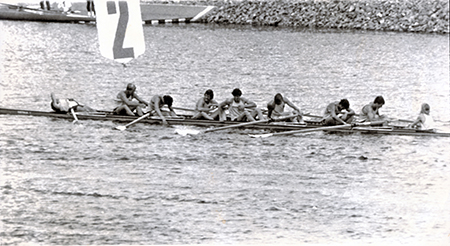
The disappointed eight after finishing fifth in the final

